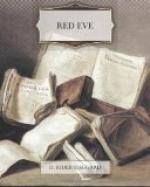“Then at last we shall come face to face,” said Hugh, with a fierce laugh.
“Yes, master,” put in Dick, “but you’ve done that several times before and always ended back to back. Pray the Saints such may not be the finish of this meeting also.”
Then he turned and went to clean his master’s armour, for in this martial dress, notwithstanding the great heat, Hugh determined to appear before the Doge. It was good armour, not that, save for the sword, which Sir Arnold had given him, whereat the Court at Windsor had laughed as out of date, but mail of a newer fashion, some of it, from the bodies of knights who fell at Crecy, after which battle such wares had been cheap.
Still, Dick could have wished that it had been better for so fine an occasion, seeing that it was marked with many a battle dint and that right across the Cressi cognizance, which Hugh had painted on his shield after he was knighted—a golden star rising from an argent ocean—was a scar left by the battle-axe of a Calais man-at-arms. Moreover Hugh, or rather Dick, took with him other armour, namely, that of the knight, Sir Pierre de la Roche, whom Hugh had killed at Crecy thinking that he was Edmund Acour, whose mail Pierre wore.
For the rest, Dick clad himself in his uniform of a captain of archers of King Edward’s guard, wearing a green tunic over his mail shirt, and a steel-lined cap from which rose a heron’s plume, pinned thereto with his Grace’s golden arrow.
All being ready they started in a painted barge, accompanied by Sir Geoffrey Carleon, who wore his velvet robe of office, and grumbled at its weight and warmth. A row of some fifteen minutes along the great canal brought them to a splendid portal upon the mole, with marble steps. Hence they were conducted by guards across a courtyard, where stood many gaily dressed people who watched them curiously, especially Grey Dick, whose pale, sinister face caused them to make a certain sign with their fingers, to avert the evil eye, as Sir Geoffrey explained to them. Leaving this courtyard they went up more steps and along great corridors into the finest apartment that they had ever seen. It was a glitter of gold and marble, and rich with paintings.
Here on a kind of throne sat the Doge Dandolo, an imperial-looking man, magnificently attired. Guards stood like statues behind him, while in front, talking together and moving from place to place, were gathered all the great nobles of Venice, with their beauteous ladies. From time to time the Doge summoned one or other of these, who was called to him by a black-robed secretary. Advancing with bows the courtier talked to him a while, then was dismissed by a gracious motion of the hand.
As the Englishmen entered this hall a herald called their names thus from a written slip of paper:
“The Cavalier Geoffrey Carleon, Ambassador of England. The Cavalier Hugh de Cressi, Messenger from the King of England, and the Captain Richard Archer, his companion.”




